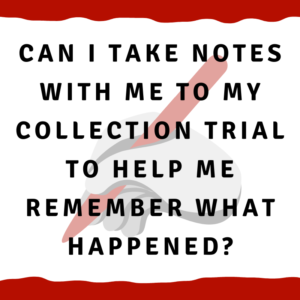Can I take notes with me to my collection trial to help me remember what happened?
Can I take notes with me to my collection trial to help me remember what happened?
Can you take notes to your upcoming collection trial?
Should you take notes to court?
If you take notes to court, what does that mean?
In Alabama, where I practice, you can certainly take notes with you to a trial.
Anything that you take with you to court can be questioned by the other side.
The collection lawyer can ask to see your notes.
Unless your particular judge doesn’t want you to, you are welcome to take notes.
We see this all the time in our personal injury cases.
If we have a doctor testify live in the trial, they will typically bring their notes, whether it is medical records or other notes that they have written down.
Expert witnesses also tend to bring their notes.
If it’s a railroad expert in a train wreck case, their notes might say they went out to the site of the accident and measured how far it was from this sign to the railroad crossing, or that they measured the decibel level of the horn, etc.
Just understand that whatever you take with you, the judge and the other side can look at.
Limit your notes to factual things.
Let’s say that you are sued on an auto deficiency after a repossession.
You went down to a local dealer and they gave you a retail installment, sales contract that went through Capital One Auto, then it went to Cascade Capital or some other debt buying company.
Now they are suing you.
They must show that they notified you before the repossession that they have your vehicle and that they are going to put it up in public auction at a specified time and location.
Or, that they are going to sell this at a “private sell” on a specified day.
But what if they say they were going to sell your vehicle on September 15th, but the notice they gave you about the sale is dated October 2nd?
Well, unless you have time travel, this is going to be a big problem.
This is a very big problem for the company who is suing you.
So, if I was representing myself, I might make note of this.
I would take the letter and highlight the portion that is wrong.
Then I would note when we’re actually doing the sale.
When bringing exhibits (evidence) into court, make several copies.
Ideally, you will want to have several clean copies which could be given to the judge, the collection lawyer, or whoever else may need to see the documents.
Then have your own copy which has your notes on it.
If you are being questioned by the collection lawyer and they request to see your notes, and the judge approves, this is fine.
All they will see your highlighted notes about the date.
If we’re talking about a typical debt buyer, such as LVNV, Midland Funding, or Portfolio Recovery, we may be looking at the chain of title.
They must show the chain of title of ownership.
Often times, they’ll be able to show it went from one company to another company, to another.
But what about the gap between two companies? Do you spot a break in the chain?
Circle this. Highlight this. Make note of this.
Ownership went from Company A to Company B, then from Company C to Company D.
No information on the transfer from Company B to Company C.
You are simply highlighting and making note of factual information.
If the collection lawyer or the judge sees this, who cares?
The trial is not a game of memory.
The trial is not being held to determine who has the best memory.
As a lawyer, I was trained that you should be able to question all witnesses, provide an opening statement, closing statement, and closing argument without any notes.
I may bring some notes with me to trial.
Usually, I’ve got a notepad sitting on my council table.
But, if I am up questioning a witness in the trial I do not bring notes with me.
I was taught to do this because the witness needs to know in their mind and in their heart that I know the facts better than they do.
If you are doing this on your own, there are no extra points for memorizing everything.
Take whatever notes you need.
Whatever points you want to make, have them in your notes.
Highlight these things. Write out your notes.
This will help you.
Just make sure you’re comfortable with the other side seeing those notes.
In other words, you would not want the notes to say “This judge is too dumb to understand.” or “I wonder if this idiot collection lawyer will realize…”
Keep your notes professional and factual.
If you’re trying a case on your own, I wish you luck. I hope you are incredibly successful.
Remember, if you are successful, look at your credit reports after your lawsuit.
If the debt collector has reported false information after you have beat them in court, you may have another claim to make against them.
If you live in Alabama and you have any questions, feel free to get in touch with us.
We would be glad to help you in any way we can.
You can reach us by phone at 1-205-879-2447, or you can fill out a contact form and we will get in touch with you quickly.
Have a great day!
